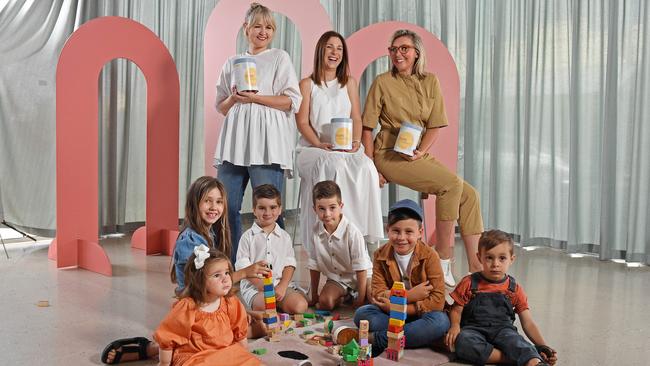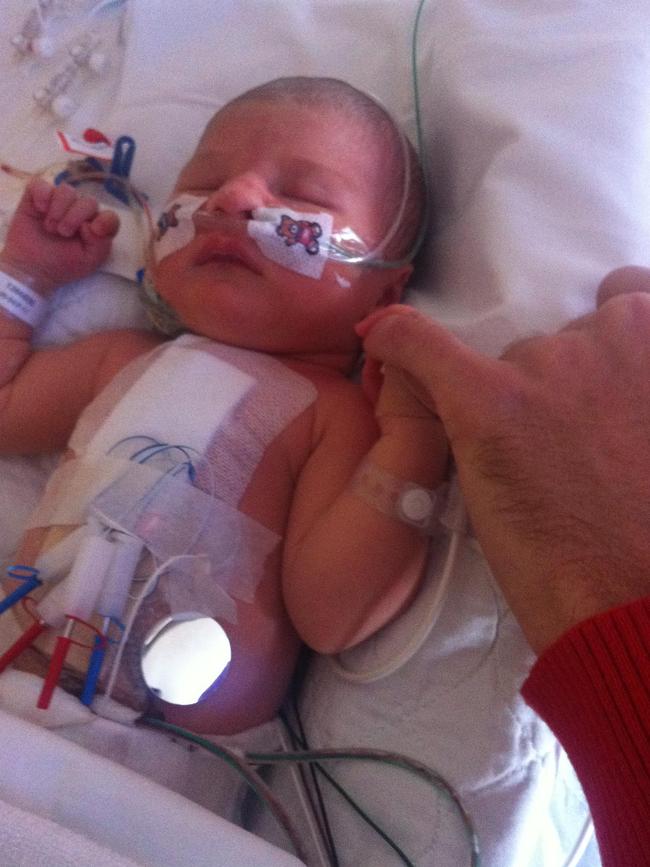The personal story behind one mum’s desire to be part of new baby formula brand Mumamoo
A trio of Adelaide mums is launching a new brand of baby formula – each are fierce advocates for breastfeeding but want the stigma around feeding choice to be lifted.

Lifestyle
Don't miss out on the headlines from Lifestyle. Followed categories will be added to My News.
Moments after Adelaide baby Kit Bate was born she was whisked away to be readied to fly to Melbourne for lifesaving heart surgery.
Her first-time parents, Belinda Humphris and Matthew Bate, learnt at the 20-week scan their precious unborn child had a serious heart defect, and would need to be operated on as quickly as possible.
What they weren’t prepared for, was the impact the stress would have on the new mum’s ability to produce milk to feed her tiny, sick baby.
While baby Kit was in the Royal Children’s Hospital, Ms Humphris was admitted to the Royal Women’s Hospital where she desperately tried to express milk for her husband to take to her newborn.
“My intention was always that I would breastfeed but it just wouldn’t happen for me, I just didn’t have supply,” Ms Humphris said.
“I was persisting in trying to express breast milk … it was such a stressful experience and I didn’t actually have a baby with me.
“But, for me, it was really difficult and, on top of a really stressful situation of having a sick baby, it took a big toll on my mental health.”
In the end Kit, now a healthy nine-year-old schoolgirl, was formula fed but the experience of the first weeks of her only child’s life remain vivid for Ms Humphris.

So much so, she teamed up with two other Adelaide mums – Kristina Scutella and Charlotte Chambers – to research and produce a new brand of Australian-made baby formula.
“We are pro-breastfeeding but we are also very understanding that some women may have a sick child, or they might be sick themselves and for them, like me, the decision to formula feed really is a necessary one,” Ms Humphris said.
In what she describes as being “like climbing Mt Everest”, the trio of women spent almost two years working with paediatric nutritionists to develop the product.
Mumamoo will be available from Sunday at independent outlets, including Drakes and Foodland supermarket stores and at National Pharmacies.
A percentage of sales will be donated to Perinatal Anxiety and Depression Australia (PANDA), a charity supporting parents – both mums and dads – who experience anxiety and depression during pregnancy and in the first year of parenthood.
“For me, the mental health impacts around feeding are a big part of the why (I became involved in this project), in terms of wanting to support other women … to make no one is left out of the (feeding) conversation,” Mrs Humphris said.
It’s a message parenting podcaster Sophie Pearce, a mother of two, is keen to broadcast.
The Beyond the Bump presenter said she was shocked by the responses she and co-presenter Jayde Couldwell got to an episode on bottle feeding.
“We heard time and time again from women about the guilt and shame they felt about switching to bottle formula and how they felt like a failure,” she said.
“It is so concerning that mums are struggling to find the support they need when it comes to making decisions around feeding their babies.”
Why we need more data on breastfeeding mothers
Adelaide neonatal experts are calling for more research into breastfeeding rates in Australia, saying any statistics that have been collated nationally are now outdated.
They say with caesarean sections on the rise here and internationally, it’s important to measure the potential impact on breastfeeding trends.
Also, to check the ramifications of changing health approaches, including women being discharged from some hospitals as soon as six hours after giving birth to their babies.
Women’s and Children’s Hospital consultant neonatologist Amy Keir, who is also a SAHMRI research fellow, said it was important to know how new mums were approaching feeding their babies, to help better support them.
“We really need good data to find out what the current state of play in Australia is, in relation to breastfeeding,” Dr Keir said.
“We need information around who is breastfeeding, who is having trouble and also who is having difficulty accessing the right kind of support.
“I think there is just this assumption that Australia is tracking pretty well with breastfeeding, that we’ve got good data but actually we don’t have the consistent, co-ordinated approach to collecting information about breastfeeding we need.
“We are one of the few countries in the world that doesn’t routinely collect this type of information.
“And, if we are not tracking it, we don’t know where improvements need to be made.”
The most recent data was compiled about 10 years ago, she said.
“(That shows) 96 per cent of women breastfeed initially but it drops off quite markedly with just 39 per cent exclusively breastfeeding at three to four months,” she said.
Dr Keir said in relation to planned C-section deliveries, an international review had found there was high evidence to show women who had a planned caesarean were less likely to be breastfeeding their babies on discharge.
“In summary, we showed that, globally, there is an association between elective CD (caesarean delivery) and lower rates of breastfeeding – the rise in elective pre labor CD is thus particularly concerning,” the review concludes.
The World Health Organisation recommends babies start breastfeeding within an hour of being born and are exclusively breastfed for six months.
SAHMRI’s head of human milk and lactation group Alice Rumbold agreed research was key to providing women with better support, and potentially boosting breastfeeding rates.
“The first couple of weeks are so critical for new mums in terms of establishing feeding properly, yet it is a time of misleading and conflicting information,” Associate Professor Rumbold said.
“There is a lot of inconsistent messaging and information for new mums … women are having to try to navigate this at a time they are sleep-deprived, recovering from a birth – it’s an issue that is consistently raised with us.”


